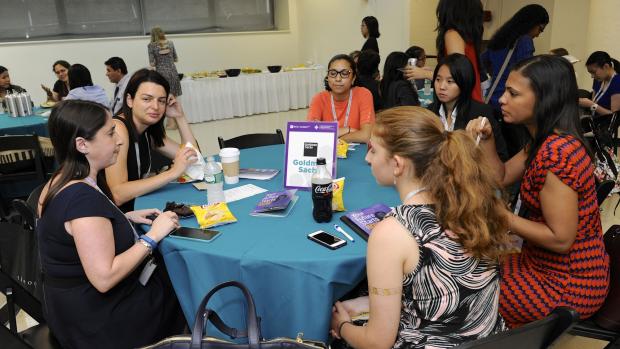Symposium Shows Women There’s Job Security in Cybersecurity

“If you take one thing away from this symposium, let it be that cybersecurity is hot. We need to improve the pipeline for women.”
With these words NYU School of Law Cybersecurity/Adjunct Professor Judith Germano opened the 2015 Career Discovery in Cyber Security: A Women’s Symposium at the NYU Polytechnic School of Engineering. Germano, a senior fellow and adjunct professor specializing in cybersecurity and privacy at the NYU School of Law, served as faculty host for the sold-out annual event in which more than 150 attendees network with mentors and hear firsthand about the challenges and opportunities of cybersecurity careers.
The symposium was founded by Nasir Memon, chair of the NYU Polytechnic School of Engineering Computer Science and Engineering Department, to help women navigate entry into the field. Interviewed during the symposium, he noted the symposium does more than interest women in the subject: It is structured to introduce them to potential career contacts and paths into the industry.
“When we first started CSAW [Cyber Security Awareness Week, now the world’s largest set of student competitions] I began to see how much the tech and especially cybersecurity sectors are ignoring half the population. Even now, only 11 percent of cybersecurity industry employees are female. The question that made us start the symposium was, ‘What are we doing for women already in the workforce?’ ”
 This year’s symposium offered a powerful answer, with many of the day’s speakers emphasizing the power to be found in approaching cybersecurity issues from new angles. Edna Reid, an associate professor in James Madison University’s Intelligence Analysis Program and a retired FBI intelligence analyst, spoke extensively on this topic. During her breakout session, the conversation focused on the diversity of skills needed—including in non-apparent fields such as human resources. Approaching cybersecurity from an analytical or social standpoint offers opportunities for a diverse range of majors, she said. The theme was echoed throughout the day.
This year’s symposium offered a powerful answer, with many of the day’s speakers emphasizing the power to be found in approaching cybersecurity issues from new angles. Edna Reid, an associate professor in James Madison University’s Intelligence Analysis Program and a retired FBI intelligence analyst, spoke extensively on this topic. During her breakout session, the conversation focused on the diversity of skills needed—including in non-apparent fields such as human resources. Approaching cybersecurity from an analytical or social standpoint offers opportunities for a diverse range of majors, she said. The theme was echoed throughout the day.
Briana Farro, a sales system engineer at the Intel Security unit McAfee, and Simone Robertson, an account manager at Intel Security, detailed the diversity of their skills during “Sales Engineer / Sales Account Manager – Could You Transition?” These positions require them to think on their feet, smoothly navigate meetings with clients, developers and legal departments, and deliver the right functionality to each client. “Depending on the client, your job can be 80 percent engineering and 20 percent sales, or it can be 20 percent engineering and 80 percent sales. But either way, you have to be able to clearly communicate what your product can do and how it’s a good fit for your client’s business in a rational way,” Farro said.
Attendees also participated in “speed mentoring,” in which they received individual advice from event speakers and other high-level women and men working in a variety of jobs. Among the in-demand speed mentors were the event’s keynote speakers, Ioana Badea and Shelly Westman.
As the leader of the Global Insights and Market Research team at Intel, Badea helps Intel make long-term marketing and technology decisions. “The best way to think about designing your future is to think about who you are and what you offer,” she told the audience. She offered a firsthand example of how it is possible to transition into cybersecurity from a seemingly unrelated path: Badea holds a master’s degree in nuclear energy engineering degree from Politehnica University of Bucharest, Romania.
 Westman is vice president and COO of security services at IBM, and in her closing keynote, she noted that cybersecurity is one of the fastest growing fields in tech. “It used to be that criminals had to sneak up on someone with a billy club to take their money, but look at this paradigm shift: Hackers now analyze social media to target thousands or millions of people,” she said.
Westman is vice president and COO of security services at IBM, and in her closing keynote, she noted that cybersecurity is one of the fastest growing fields in tech. “It used to be that criminals had to sneak up on someone with a billy club to take their money, but look at this paradigm shift: Hackers now analyze social media to target thousands or millions of people,” she said.
 “Why do we need women in cybersecurity? Women today make up 50 percent of college graduates, but only 11 percent of cybersecurity jobs are filled by women,” Westman said. “You want job security? Work in cybersecurity.”
“Why do we need women in cybersecurity? Women today make up 50 percent of college graduates, but only 11 percent of cybersecurity jobs are filled by women,” Westman said. “You want job security? Work in cybersecurity.”




